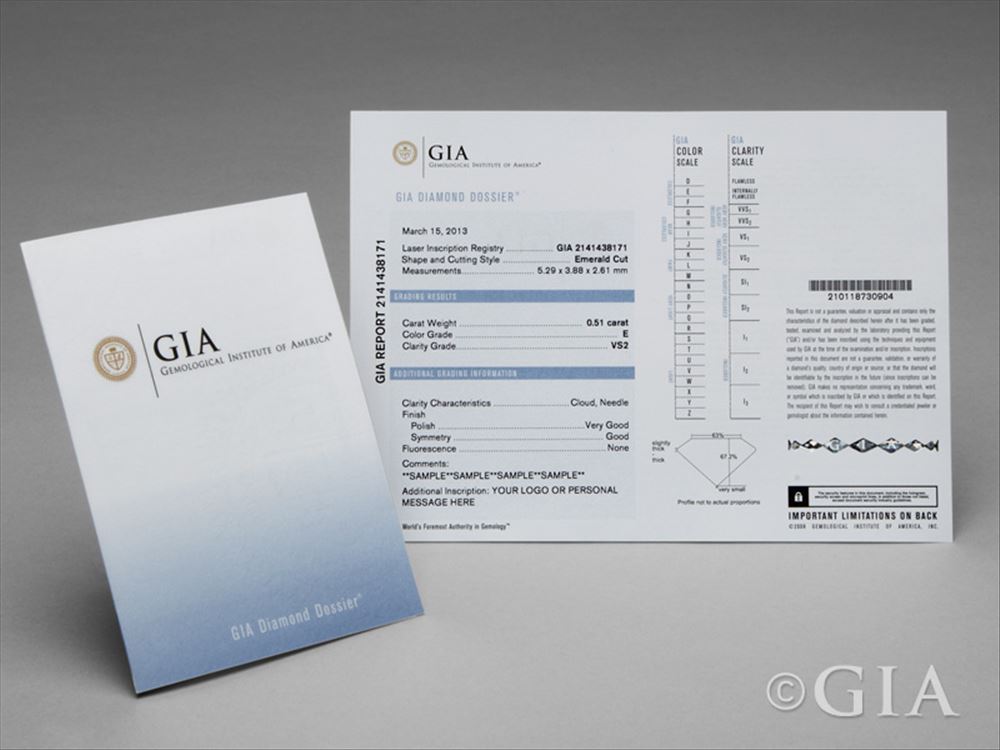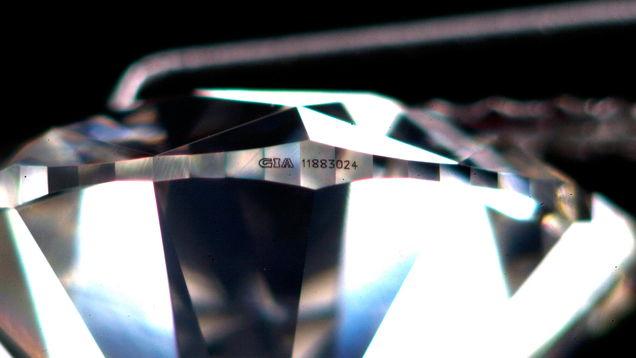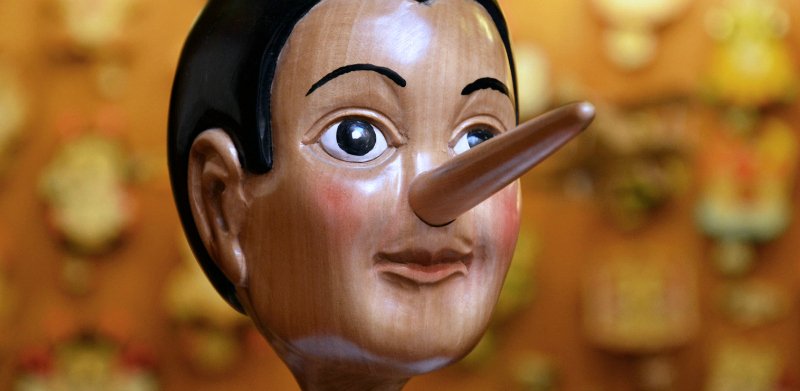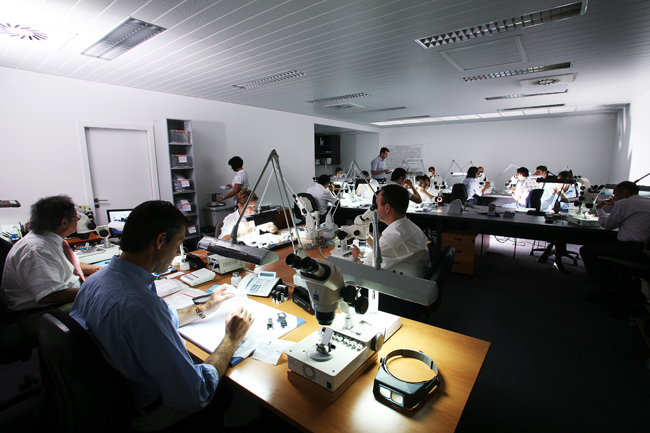Welcome to one of the touchiest subjects in the world of diamonds!
OK – lets do it…
Most engagement ring shoppers are first time diamond buyers with a very limited knowledge of diamonds. Although most buyers insist on only buying “certified diamonds” these days that’s pretty much where the checks and balances end. At the end of the day – everyone just wants a great deal…
So, a customer buys a diamond ring from a jeweller and rests assured since he received a legitimate looking Post-it™ note sized “independent diamond grading certificate” with his purchase.

Here’s the problem in a nutshell: diamond prices are calculated using the specifications (cut, colour, clarity and weight) indicated on these diamond grading certificates. So if the grading certificate is overstated you’ll be overpaying for the diamond – as simple as that.
Although the human element can account for the odd honest mistake made in grading reports there’s a darker side to this story: diamonds are sometimes deliberately over-graded by laboratories to benefit jewellers and diamond dealers.
But… Why?!?
Grading laboratories aren’t non-profit organisations regulated by some special government committee. They are businesses that want to make money. These “independent diamond grading certificates” are their products.
Although most laboratories try to differentiate themselves on turn-around time, reputation or price… some have turned to gravely unethical practises in an effort to stay in business.
By issuing overly favourable (read: inaccurate) certificates, a laboratory can help a diamond dealer fetch as much as double the honest asking price for a diamond. Grade it as two colours and clarities higher than it really is and you have one very happy and loyal diamond dealing customer. You can bet on repeat business!
Unfortunately, this over-graded stone is now on it’s way to a display somewhere where it’s offered at a price based on this inaccurate grading certificate. Someone will be getting way less diamond than they paid for and the diamond dealer will be laughing all the way to the bank.
Surely Someone Has To Be Policing These Laboratories…?
Not really.
Fine print on diamond certificates generally make it very clear that the grading report is just an opinion and the customer has no claim against the laboratory should there be any errors or inaccuracies on the certificate.
Trained diamond dealers can judge a diamond on its true merit and characteristics, but many end-users rely on these often grossly overstated “independent grading certificates” to compare quotes and make purchase decisions.
Although the World Federation of Diamond Bourses has stated that members (jewellers and diamond dealers) selling these over graded diamonds can be held liable – these over-graded diamonds are usually sold in jewellery pieces to the unsuspecting public. These opportunistic jewellers and diamond dealers very rarely get caught out.
Here’s a worst case scenario for you… see this link for a case where the misrepresentation of a diamond’s specifications elevated the price/value by 500%!
In a recent open letter to the diamond industry Mr. Ernie Blom, the President of the World Federation of Diamond Bourses, has stated that “In blatant cases the misrepresentation can amount to fraud with criminal consequences…”.
Things are getting hot in here – and no one’s breaking a sweat.
So, How Can You Protect Yourself From These Irregularities?
First and foremost – it’s a trust issue.
Find a jeweller with proper references you can contact. The fact that they are members of certain trade organisations just means that the company was able to transfer the yearly membership fee. Nothing more. Close to anyone can join these trade organisations. At a minimum do a Google search on the brand and check for social cues and references on social media profiles. You want someone with a name and reputation to protect.
Educate yourself. The internet is full of blogs like our own trying to spread some honest information. Read. Read. Read. The more questions you can ask the better you’ll be off.
When buying a diamond at least give the issuing laboratory a call and check if they did indeed issue a certificate for the diamond. Just ask – “Did you issue certificate 1234567? Can you please confirm the specifications?” Their answers should obviously perfectly match the certificate at hand.

Some laboratories laser-inscribe the grading certificate number on the diamond’s girdle. Although it can be hard to see (you need a microscope or loupe) it’s an added bonus that you can, with some certainty, match up the diamond to the certificate.
At this stage you can be certain that a.) the laboratory did indeed issue the certificate and b.) that the diamond in the parcel is actually the diamond that was graded by the laboratory and wasn’t swapped for an inferior stone.
Now… Our last problem… is the certificate accurate?
It’s impossible to say a certain lab is always right and another always wrong. Even a broken clock is right twice per day.
But I’ll tell you who the industry bets on: The Gemological Institution of America (G.I.A)
A G.I.A report is the Rolls Royce of grading certificates. They’re the sole leaders in this field and definitely the most respected diamond grading laboratory in the world. They have an enormous reputation to uphold and you can be sure that great care is taken with every diamond they grade.
The G.I.A is so trusted in the industry that many multi-million dollar international deals are closed without the buyer even seeing the diamonds he is purchasing. Decisions are made based on G.I.A certificates. The industry trusts the G.I.A.
You’ll actually find many top jewellers that use the fact that they only sell G.I.A graded diamonds as a marketing point.
If you can’t buy a diamond with a G.I.A certificate for any reason, please make dead-sure you’re buying from a reputable business. Obviously other laboratories can also issue accurate certificates, but then you’ll be at the mercy of the jeweller selling the stone. Can you trust them?
The great deals from your uncle’s friend’s cousin are usually priced so fantastically for all the wrong reasons. If a diamond is over-graded it’s easy to offer it at an excellent price and still make good money.
As a final statement: I’m not saying all diamond grading laboratories other than the G.I.A are crooked. Most are perfectly fine. Just remember to stay vigilant when making this very emotional and expensive purchase.
The Aftermath. (True Story)
Around 2 days after we started disseminating information about the over-grading of diamonds to the public we received a call from an official regulatory body informing us that a complaint has been lodged… anonymously of course.
The word “fraud” should apparently not be used in communication with the public, and should stay safely guarded on industry open letters. Therefore we removed all references to blatant diamond grading fraud from this blog post and only referenced a quote by Mr Blom himself.
Although a simple Google will get you far, here is a condensed reading list for more information:
- http://www.timesofisrael.com/diamonds-not-always-a-buyers-best-friend-dispute-shows/
- http://www.schoolofgemology.com/ISGCommunity/content.php/52-Diamond-Grading-Labs-Add-to-Insurance-Fraud-Issues
- http://www.jckonline.com/blogs/cutting-remarks/2014/11/19/there-accepted-diamond-grading-standard
- http://www.worldnewstomorrow.com/?p=4004
- http://www.wfdb.com/news/presidents-message/312-presidents-message-27
If you’re new to diamonds (and don’t want to be ripped off) a great first stop will be our free ebook “Buying A Diamond Like A Diamond Dealer”. It’s full of honest, unbiased facts to help you get the best diamond for your money!
{{cta(‘11654f6a-9aa3-4e50-b5c9-77b00068bd8a’)}}


